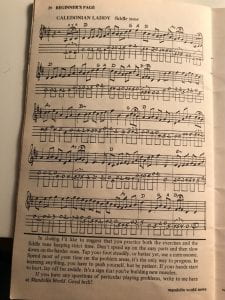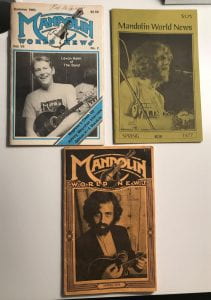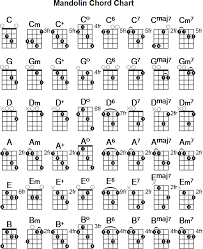Hello and welcome to my final blog post for my in-depth mandolin project!
What are you going to prepare for in-depth night?
For the in-depth night, I will be preparing a mandolin tune. The song I have chosen is “Caledonian Laddy” which is a fiddle tune. The song is quite fun and cheery because it was made for dance. It is Scottish folk song inspired which I find interesting because I feel I have spent less time learning about folk music and would like to try more. I will play the tune once through at a medium pace because it matches my skill level and because the tune wasn’t designed to be played incredibly fast.
What elements will you capture?
The song will show how I have grown to become comfortable with my instrument. I have chosen it because it was the first full tune I started working with, so I can show the most improvement. It shows my improvement in the skill I wanted to improve in the most, picking. It also shows how I have learned about new mandolin music because it is Scottish folk music which I had never listened to before this project. I hope that in my performance I can capture how I have improved my skill because I can play a clear and smooth version of the song.
How will the audience interact with your presentation?
The audience will be watching and listening to my performance of the song. While they are watching and listening there are different parts of the performance that I hope they notice. The audience will be able to notice the clarity of my playing of the notes which has been something I have been working to improve on throughout my project. I also hope that they notice the happiness of the song which was what draw me to it. I wanted something that was fun to play for the performance because it is a celebration of my achievements so far. The audience will also get to see the way I play. They will be able to see that I use the proper picking pattern and proper fretting hand placement which have been two important components of my learning.
What was a highlight for you and why?
The main highlight for me with this project was learning about the community of people who play the mandolin. It isn’t as popular of an instrument as others, so I found it really interesting learning about all the people, programs, and music in the community. I don’t think this would have been able to be a highlight for me without my mentor’s vast knowledge of all kinds of mandolin music and resources, so I am extremely grateful to him.
Here are links to some mandolin songs I have found and enjoyed through this project:
Summer’s End – Sierra Hull
Lemons and Tangerines – AJ Lee & Blue Summit
Over the Rainbow/What a Wonderful World – Chris Webster
Another highlight of this project has been the moments when I reach points in my learning where I can apply the skills to actual music. Practicing skills can be tedious and repetitive but the moment when you play it in a song and hear it come together makes it worth it. I find that in the moments I feel proud of myself for my improvement and impressed that I can actually make music with the knowledge I have gained.
What was particularly challenging and why?
One challenge I encountered throughout my whole project was knowing what direction to take my learning next. I created a plan before starting the project but as I learned I find other routes that could be interesting and found that some routes weren’t possible. Being able to choose what I learn is something I find very exciting, but it also leaves room for a lot of choices I have to make. One reason this was a challenge for me was that I felt like sometimes, I didn’t know enough about my skill yet to make decisions. It was hard choosing songs or techniques to learn when I didn’t understand how challenging they could be. I also found that sometimes I wouldn’t know all the directions I could go with a song. Luckily, throughout the project, I was able to turn to my mentor. He was able to offer me options and information which have helped me make decisions with a better understanding of what I’m choosing.
Where might this skill take you next?
This skill has definitely inspired me to want to continue to learn new instruments. I have enjoyed my time learning the mandolin and I want to continue to improve at it, but it has also shown me what it’s like to learn new instruments. The guitar was the first instrument I learned, and it has been challenging for me, but I have found that learning the mandolin, though it did have challenges, has been much more enjoyable because I didn’t have to start at music ground-zero. Through listening to the music with mandolin in it I definitely have grown a liking for the banjo which could be an interesting next instrument. The mandolin is also commonly an accompaniment instrument so in the future if I were to meet guitar, fiddle, or other folk instrument players I would love to play with other people. I feel like an opportunity like that would improve my creativity in music. This is because my mentor has talked about his experience with finding a tune and just riffing around with it with other players for hours. I have never been able to do this and think that I could learn a lot about the mandolin from something like that.
Learning Update:
The past couple of weeks have been focused on refining the tunes I have been working on. I have been practicing “Caledonian Laddy” every time I pick up my mandolin to prepare for in-depth night. I feel very confident in the first couple of lines of the song, so I need to spend more time focused on the last lines to bring them up to the level as the first. I have also been practicing “Cold Frosty Morning”. My mentor recorded an audio clip of him playing it, so I have been using it to improve my consistency as I play the song. I have also been learning a modified A minor scale to better understand that tune as well. To wrap up those tunes in the next couple of weeks I want to continue to constantly practice “Caledonian Laddy” and learn the chords for the two tunes to expand my chord knowledge on the mandolin.
Thanks for reading!
 ‘Caledonian Laddy’ is a fiddle tune that I found in the beginner section of a Mandolin Weekly magazine. I tried it out and thought it would be a great first tune to learn because it is relatively simple, but still allows me to start playing songs. I spoke with my mentor about it and he gave me some tips on how to play it. He also told me that the first-ever song I chose just happened to be from the first-ever copy of the magazine that he received which I thought was an interesting coincidence. I have also been listening to lots of mandolin music that my mentor recommended to me. I ended up really enjoying two of the artists he mentioned. One of them was AJ Lee & Blue Summit and the other was Sierra Hull. In the next two weeks, I have two main skills I want to work on. The first is to continue learning new scales and working on the fiddle tune. I am also planning on learning some chords from a chord chart that my mentor is making for me. To continue learning about mandolin music my mentor mentioned some other women who play mandolin that I could try and I plan on listening to them.
‘Caledonian Laddy’ is a fiddle tune that I found in the beginner section of a Mandolin Weekly magazine. I tried it out and thought it would be a great first tune to learn because it is relatively simple, but still allows me to start playing songs. I spoke with my mentor about it and he gave me some tips on how to play it. He also told me that the first-ever song I chose just happened to be from the first-ever copy of the magazine that he received which I thought was an interesting coincidence. I have also been listening to lots of mandolin music that my mentor recommended to me. I ended up really enjoying two of the artists he mentioned. One of them was AJ Lee & Blue Summit and the other was Sierra Hull. In the next two weeks, I have two main skills I want to work on. The first is to continue learning new scales and working on the fiddle tune. I am also planning on learning some chords from a chord chart that my mentor is making for me. To continue learning about mandolin music my mentor mentioned some other women who play mandolin that I could try and I plan on listening to them.
 For my in-depth this year I have decided to learn how to play the mandolin. The mandolin is a stringed instrument that is commonly heard the most in different kinds of classical and folk music. The mandolin I will be learning is an eight-string instrument but has only four notes in double-stringed pairs to create the mandolin’s signature sound.
For my in-depth this year I have decided to learn how to play the mandolin. The mandolin is a stringed instrument that is commonly heard the most in different kinds of classical and folk music. The mandolin I will be learning is an eight-string instrument but has only four notes in double-stringed pairs to create the mandolin’s signature sound.